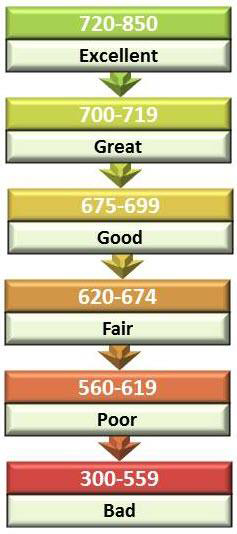 Most people today are aware of credit scores and that a credit score can be good or bad, but don’t know much more than that, so I thought I would explain what a credit score is to help people gain a better understanding of the seemingly innocuous score that can have a major impact on areas of people’s lives that they aren’t even aware of.
Most people today are aware of credit scores and that a credit score can be good or bad, but don’t know much more than that, so I thought I would explain what a credit score is to help people gain a better understanding of the seemingly innocuous score that can have a major impact on areas of people’s lives that they aren’t even aware of.
A credit score is a numerical representation of your creditworthiness and, more importantly, of the likelihood that you will become 90 days or more delinquent on any particular debt. The most widely used credit score is the FICO® score, which was developed by Fair, Isaac, and Company, Inc. in the 1960s.
It is a number that summarizes your credit risk based on a snapshot of your credit profile at a particular point in time. A credit score helps lenders evaluate your credit profile and estimate your credit risk. Credit scores range from 300 to 850 and the higher your score is the better.
To be clear, there isn’t really a credit score sitting out there with your name on it. Your credit score is actually generated the moment that it is requested by a creditor. For this reason your credit score will vary depending on your credit profile at the time it is requested.
Each person has three credit scores and while they will likely be similar, they will not be the same. The reason the credit scores will be different are 1) each credit bureau uses its own proprietary scoring model, 2) not all creditors report your payment history to each of the three credit bureaus, and 3) not all creditors report your payment history on a monthly basis.
Each credit bureau uses its own proprietary scoring model, or algorithm, to generate a credit score based on the information being reported to them by your individual creditors. The three primary national credit repositories are Experian, TransUnion, and Equifax. There is a fourth lesser known and lesser utilized credit bureau named Innovis. The very fact that each credit bureau has its own formula will be cause for unique and different credit scores.
Not all creditors report to all three credit bureaus. Creditors have to pay a fee to report your payment history to the credit bureaus and some creditors may not want to pay to report your payment history to each of the credit bureaus. Some creditors may choose to report to only one or two credit bureaus. This means that each credit bureau will potentially be using different information than the others.
Not all creditors report your payment history to the credit bureaus every month. Some creditors may elect to report your payment history on a monthly basis, while others may elect to report every other month, and still others elect to report every quarter.
Hopefully, you have a better understanding of what a credit score is. For more information on credit and credit scoring download our FREE report entitled “Credit Scoring and Wealth – The Game of Credit.”
I will explain what doesn’t affect your credit score in another post so be sure to check back.
Leave a Comment